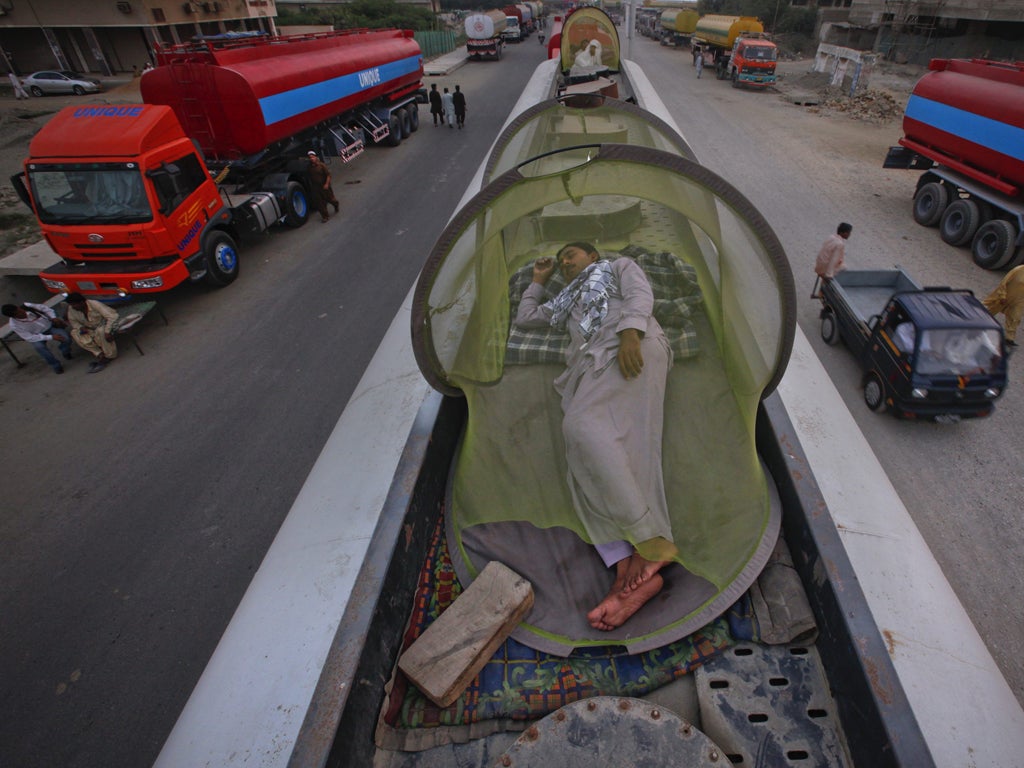Pakistan cuts off Nato's supply line after 25 troops killed
US ordered to quit airbase as jets and helicopters pursuing Taliban militants shoot sleeping soldiers

Pakistan cut off Nato's supply route to Afghanistan and angrily denounced the violation of its sovereignty after an air attack killed at least 25 troops at a border checkpoint yesterday.
Nato jets and helicopters were said to be pursuing militants on the Afghanistan-Pakistan border when they opened fire and hit the Pakistani soldiers asleep at posts in the Mohmand tribal agency.
In retaliation, Pakistan rapidly choked off Nato supply routes through the Khyber Pass and the Chaman border in the south-western province of Baluchistan. Nato relies on the routes through Pakistan for up to half of its non-lethal supplies.
Last night arrangements between Pakistan and Nato were set to be reviewed after an extraordinary meeting of Pakistan's senior ministers and military chiefs. One report said the US had been given 15 days to leave the Shamsi airbase – Pakistan had told the US to leave it in June.
The Mohmand attack has opened a new crisis between Islamabad and Washington at a time when the decade-long alliance against Islamist terrorism is at an all-time low. Over the past year, the two allies have repeatedly clashed over intelligence, the Afghan insurgency and the raid that ended in Osama bin Laden's death. After the emergency cabinet meeting, Pakistan's Prime Minister, Yousaf Raza Gilani, said: "This is an attack on Pakistan's sovereignty."
General Ashfaq Parvez Kayani, the powerful army chief, also strongly criticised the attack. He called for "all necessary steps [to] be undertaken for an effective response to this irresponsible act". "A strong protest," he said, "has been launched with Nato/ISAF [western forces in Afganistan] in which it has been demanded that strong and urgent action be taken against those responsible".
Pakistan has occasionally choked supply lines as a symbolic protest, but it has always reopened them within days; Western officials say supplies have not been badly disrupted.
General John Allen, the top Nato commander in Afghanistan, offered his condolences to the families of "any soldiers who may have been killed or injured" and said that he was investigating the circumstances that led to the "incident".
It is unclear how or why the attack happened. Brigadier General Carsten Jacobson, a Nato spokesman, said that its forces were operating close to the border in eastern Afghanistan's Kunar province against militants in the early hours of Saturday morning. Close air support was called in, which probably caused the casualties, he said.
In a statement, the Pakistan army called the attack "unprovoked and indiscriminate firing". Its soldiers were all asleep at the time, a military official said.
The military border posts had recently been established by the Pakistan army to stem the flow of Pakistani Taliban militants returning to Pakistan to mount attacks on the territory they once controlled.
Since the Pakistan army launched sweeping military offensives in the Swat Valley and other parts of Pakistan's north-west, the Pakistani Taliban militants have taken sanctuary on the east bank of the Kunar River in Afghanistan. Pakistani military officials say that hundreds of such militants mount raids from there.
The new crisis underscores the fragility of the Afghanistan-Pakistan border, which is also known as the Durand Line. The long, porous border has been ill policed since it was first drawn up in colonial times. It is mountainous territory .
In recent months, tensions have risen on both sides of the border as the US blamed Pakistan for backing the Haqqani network and other pro-Taliban Afghan insurgents, who mount cross-border attacks from sanctuaries in Pakistan's tribal areas.
In September, Admiral Mike Mullen, the recently retired chairman of the Joint Chiefs of Staff, went so far as to describe the Haqqani network as "a veritable arm" of Pakistan's Inter-Services Intelligence (ISI) agency after a series of deadly attacks in Kabul were traced back to the militant group.
Pakistan is likely to seize on this moment and use it as leverage to argue against claims that it is not doing enough to crack down on terrorists on its soil. Washington's attempts to win greater Pakistani co-operation in bringing the conflict in Afghanistan to an end may suffer temporarily, too.
But officials and analysts said that there are very real limits to Pakistani outrage. They expect Nato supplies to flow once again after the attack has been investigated and apologies have been accepted.
Subscribe to Independent Premium to bookmark this article
Want to bookmark your favourite articles and stories to read or reference later? Start your Independent Premium subscription today.

Join our commenting forum
Join thought-provoking conversations, follow other Independent readers and see their replies